初中一般将来时讲解练习与答案边
(完整版)一般将来时态讲解及练习和答案
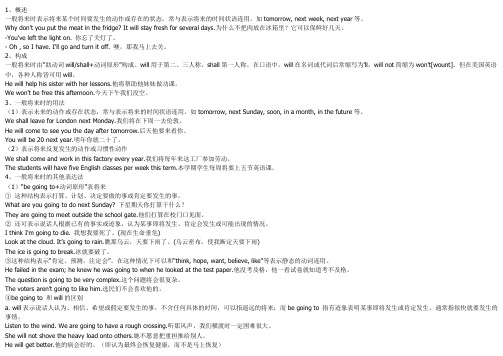
1、概述一般将来时表示将来某个时间要发生的动作或存在的状态,常与表示将来的时间状语连用,如tomorrow, next week, next year等。
Why don’t you put the meat in the fridge? It will stay fresh for several days.为什么不把肉放在冰箱里?它可以保鲜好几天。
-You've left the light on. 你忘了关灯了。
- Oh , so I have. I'll go and turn it off. 噢,那我马上去关。
2、构成一般将来时由“助动词will/shall+动词原形”构成。
will用于第二、三人称,shall第一人称。
在口语中,will在名词或代词后常缩写为'll,will not简缩为won’t[wount]。
但在美国英语中,各种人称皆可用will。
He will help his sister with her lessons.他将帮助他妹妹做功课。
We won't be free this afternoon.今天下午我们没空。
3、一般将来时的用法(1)表示未来的动作或存在状态,常与表示将来的时间状语连用,如tomorrow, next Sunday, soon, in a month, in the future等。
We shall leave for London next Monday.我们将在下周一去伦敦。
He will come to see you the day after tomorrow.后天他要来看你。
You will be 20 next year.明年你就二十了。
(2)表示将来反复发生的动作或习惯性动作We shall come and work in this factory every year.我们将每年来这工厂参加劳动。
英语一般将来时专题练习(及答案)含解析
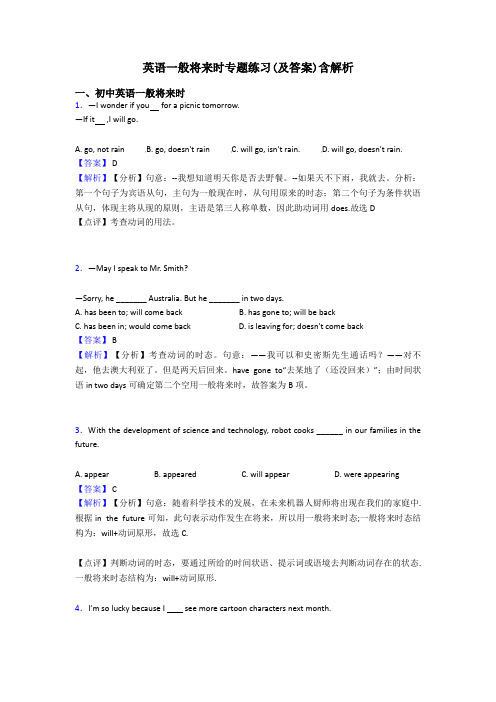
英语一般将来时专题练习(及答案)含解析一、初中英语一般将来时1.—I wonder if you for a picnic tomorrow.—If it ,I will go.A. go, not rainB. go, doesn't rainC. will go, isn't rain.D. will go, doesn't rain.【答案】 D【解析】【分析】句意:--我想知道明天你是否去野餐。
--如果天不下雨,我就去。
分析:第一个句子为宾语从句,主句为一般现在时,从句用原来的时态;第二个句子为条件状语从句,体现主将从现的原则,主语是第三人称单数,因此助动词用does.故选D【点评】考查动词的用法。
2.—May I speak to Mr. Smith?—Sorry, he _______ Australia. But he _______ in two days.A. has been to; will come backB. has gone to; will be backC. has been in; would come backD. is leaving for; doesn't come back【答案】 B【解析】【分析】考查动词的时态。
句意:——我可以和史密斯先生通话吗?——对不起,他去澳大利亚了。
但是两天后回来。
have gone to“去某地了(还没回来)”;由时间状语in two days可确定第二个空用一般将来时,故答案为B项。
3.With the development of science and technology, robot cooks ______ in our families in the future.A. appearB. appearedC. will appearD. were appearing【答案】 C【解析】【分析】句意:随着科学技术的发展,在未来机器人厨师将出现在我们的家庭中. 根据in the future可知,此句表示动作发生在将来,所以用一般将来时态;一般将来时态结构为:will+动词原形,故选C.【点评】判断动词的时态,要通过所给的时间状语、提示词或语境去判断动词存在的状态. 一般将来时态结构为:will+动词原形.4.I’m so lucky because I see more cartoon characters next month.A. is able toB. will be able toC. be able toD. was able to【答案】B【解析】【分析】句意:我真幸运因为我下个月能看到更多的卡通人物。
一般将来时讲解及练习(含答案)
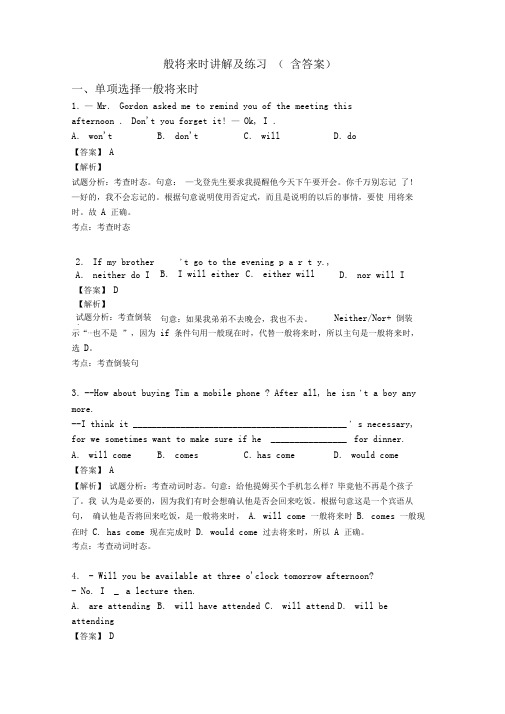
般将来时讲解及练习(含答案)一、单项选择一般将来时1.—Mr.Gordon asked me to remind you of the meeting thisafternoon .Don't you forget it! —Ok, I .A.won't B.don't C.will D.do【答案】A【解析】试题分析:考查时态。
句意:—戈登先生要求我提醒他今天下午要开会。
你千万别忘记了!—好的,我不会忘记的。
根据句意说明使用否定式,而且是说明的以后的事情,要使用将来时。
故A 正确。
考点:考查时态2.If my brother doesn 't go to the evening p a r t y.,A.neither do I B.I will either C.either willI D.nor will I【答案】D 【解析】试题分析:考查倒装句:句意:如果我弟弟不去晚会,我也不去。
Neither/Nor+ 倒装句,表示“⋯也不是”,因为if 条件句用一般现在时,代替一般将来时,所以主句是一般将来时,选D。
考点:考查倒装句3.--How about buying Tim a mobile phone ? After all, he isn 't a boy any more.--I think it _____________________________________________ ' s necessary, for we sometimes want to make sure if he ________________ for dinner. A.will come B.comes C.has come D.would come【答案】A【解析】试题分析:考查动词时态。
句意:给他提姆买个手机怎么样?毕竟他不再是个孩子了。
我认为是必要的,因为我们有时会想确认他是否会回来吃饭。
初中一般将来时态讲解+练习(后附答案)
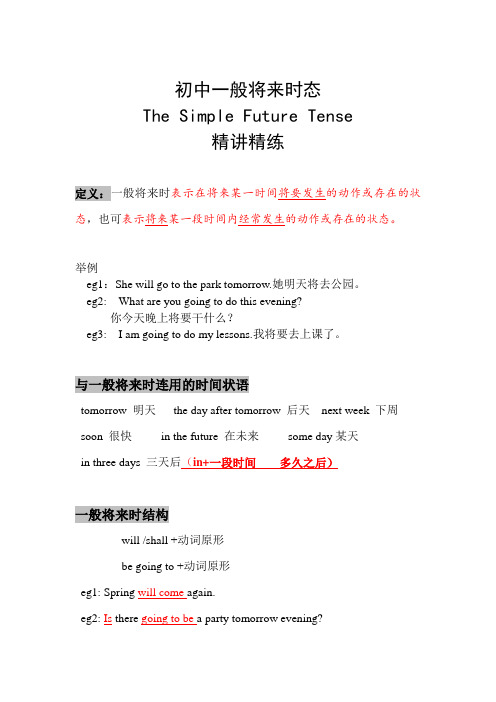
初中一般将来时态The Simple Future Tense精讲精练定义:一般将来时表示在将来某一时间将要发生的动作或存在的状态,也可表示将来某一段时间内经常发生的动作或存在的状态。
举例eg1:She will go to the park tomorrow.她明天将去公园。
eg2: What are you going to do this evening?你今天晚上将要干什么?eg3: I am going to do my lessons.我将要去上课了。
与一般将来时连用的时间状语tomorrow 明天the day after tomorrow 后天next week 下周soon 很快in the future 在未来some day某天in three days 三天后(in+一段时间多久之后)一般将来时结构will /shall +动词原形be going to +动词原形eg1: Spring will come again.eg2: Is there going to be a party tomorrow evening?一般将来时的各种句型1.肯定句:主语+shall/will+动词They will go shopping this afternoon.We shall be there before dark.2.否定句:主语+shall/will+not+动词They will go shopping this afternoon.We shall not be there before dark.3.一般疑问句:shall/will+主语+动词?Will they go shopping this afternoon?Shall we be there before dark?4.特殊疑问句:特殊疑问词+shall/will+主语+动词?When will they go shopping?What shall I do?5.there be的将来时:there will be+….There will be a show in the park tonight.练习:1.我明天要去看望我的奶奶。
【语法】初中英语一般将来时讲解与练习(含答案)50题

初中英语:一般将来时专项练习题1.Teenagers _________ to look after themselves from a young age. A.should educate B.should be educated C.shouldn’t be educated D.not should educate【答案】B【解析】【详解】句意:青少年应该接受教育,从小就照顾自己。
考查被动语态。
should应该,后接原形动词;本句主语teenagers青少年,是动词educate 的受动者,需用被动语态,可排除AD选项。
根据句意语境,可知本句是肯定意义,故选B。
2.-The Big Parade(大阅兵) in Russia has made a big hit in the world and another one on September 3rd, 2015,in China.-Yes, I can't wait to meet the excitement.A.was held B.is heldC.has been held D.will be held【答案】D【解析】【详解】试题分析:句意:——俄国的大阅兵在世界上取得了很大成功,并且又一次大阅兵将在2015年九月三日在中国举行。
——我迫不及待地要满足兴奋。
根据语意句子用一般将来时的被动语态,故答案选D。
考点:考查时态和语态。
3.--- A new shopping mall ______ next year in our town.--- Really? It is wonderful! I needn’t go far away to buy things.A.is built B.has built C.will build D.will be built 【答案】D【解析】【详解】句意:——一家新的购物商场将于明年建在我们的家乡。
初中英语一般将来时讲解与练习(含答案)

一般将来时讲解与练习一、概念:一般将来时表示将来某个时间要发生的动作或存在的状态,及计划、打算或准备做某事。
常常与表示将来的时间状语连用。
如:tomorrow,next day(week, month, year…),soon,the day after tomorrow(后天)等。
二、常用的表达形式共有五种,现归纳如下:(一)“will +动词原形”这一形式,主要用于在以下几个方面:1、表示单纯的未来“将要”通用于各个人称。
eg:They will go to visit the factory tomorrow. 明天他们将去工厂参观。
I’ll come with Wang Bing and Yang Ling. 我将和王兵、杨玲一起来。
The rain will stop soon. 雨很快就要停了。
2、表示不以人的意志为转移的自然发展的未来的事。
eg:Today is Saturday. Tomorrow will be Sunday. 今天是星期六。
明天是(将)是星期日。
He will be thirty years old this time next year. 明年这个时候他就(将)三十岁。
3、问对方是否愿意做某事或表示客气地邀请或命令。
eg: Will you please turn on the radio? 请打开收音机好吗?Will you go to the zoo with me? 你和我一起去动物园好吗?Shall we go there at five? 我们五点钟去那儿,好吗?Will you please open the door? 请你把门打开,好吗?注:在口语中will用于所有人称,书面语中第一人称常用shall。
(二)“be going to+动词原形”的形式,表示事先经过考虑、安排好打算、计划要做的事情以及已有迹象表明必将发生某事,意为“打算;就要”。
初中一般将来时讲解练习及答案边

语法练习一般将来时一般将来时的概述:一般将来时表示将来某个时间要发生的动作或存在的状态,也可以表示将来经常或反复发生的动作。
常常和表示将来的时间状语连用,如:tomorrow,next week,in 2008等。
如:Li Lei will visit her grandmother tomorrow morning.一般将来时的用法:1.表示将要发生的动作。
如:Perhaps I shall (will) pay a visit to France this winter. 可能在今年冬天到法国观光。
We shan't (won’t) be free tomorrow. 我们明天没空。
Will you be at home at seven this evening? 今晚七点你会在家吗?The agreement will come into force next spring. 协议将在明年春天生效。
常用于此类情况的时间状语有:1).表示未来的时间状语tomorrow明天,next year明年,from now on从现在起,in a month一个月之后,in the future将来,等。
2).包含现在的时间状语today今天,this evening今天晚上,this week这个星期,this month这个月,this year今年,等。
2. “be going to +do”多用于口语中,表示打算、表示将要发生的事情。
如:What are you going to do tomorrow? 明天你要干什么?We are going to visit the Summer Palace next week. 下个星期我们要去参观颐和园。
Look at the dark clouds, there is going to be a storm. 看那乌云,暴风雨快来了。
3. “be +to do”表示安排或计划好了的动作。
(英语)初中英语一般将来时讲解与练习(含答案)

初中英语:一般将来时专项练习题1.Who will ________ to ________ at tomorrow’s meeting by the teacher?A.be told; say B.be asked; speak C.be told; talkD.be asked; tell【答案】B【解析】【详解】句意:在明天的会议上谁将被老师要求发言?考查动词辨析。
被要求发言,故用be asked;tell指告诉,speak指发言、演讲,故用speak。
故选B。
2.-The Big Parade(大阅兵) in Russia has made a big hit in the world and another one on September 3rd, 2015,in China.-Yes, I can't wait to meet the excitement.A.was held B.is heldC.has been held D.will be held【答案】D【解析】【详解】试题分析:句意:——俄国的大阅兵在世界上取得了很大成功,并且又一次大阅兵将在2015年九月三日在中国举行。
——我迫不及待地要满足兴奋。
根据语意句子用一般将来时的被动语态,故答案选D。
考点:考查时态和语态。
3.A hanfu show in Museum of History next week.A.is held B.was held C.will be held D.has been held【答案】C【解析】【详解】句意:汉服表演下周将在历史博物馆举行。
考查动词语态辨析。
next week下周,用于一般将来时;show是动词hold(举行)的受动者,需用被动语态,可排除ABD三项。
根据句意结构,可知选C。
4.Some new schools in Nanjing in the near future, which satisfies the citizens'needs for more resources.A.were built B.are built C.will build D.will be built 【答案】D【解析】【详解】句意:在不久的将来,南京将新建一些学校,这将满足市民对更多资源的需求。
一般将来时讲解(附习题+答案)

一般将来时讲解(附习题+答案)一、一般将来时的含义:表示动作发生在将来二、一般将来时的句型:(1) will/shall+动词原形(2) be going to+动词原形三、一般将来时的时间状语:tomorrow(明天)、the day after tomorrow(后天)、next...(下一...): next week(下一周)、next year(明年)、next month(下个月)in+一段时间(...之后): in three days(三天之后)、in the future在未来this evening(今天晚上)四、一般将来时的句型结构:(1) will/shall+动词原形(will not =won’t)(will 各种人称均可用,shall 只能用于第一人称)1)肯定句:主语+will/shall+动词原型...如:I will go to school tomorrow.我明天将会去学校He will go to school tomorrow.他明天将会去学校。
2)否定句:主语+will/shall+not+动词原型...如:I won’t go to school tomorrow.我明天将不会去学校。
He won’t go to school tomorrow.他明天将不会去学校。
3)一般疑问句:Will/Shall +主语+动词原型...如:Will you go to school tomorrow?你明天要去学校吗?Will he go to school tomorrow?他明天要去学校吗?肯定回答:Yes, 主语+will.如:Yes, I will.Yes, he will.否定回答:No,主语+will+not.如:No, I won’t.No, he won’t.4) 特殊疑问句:特殊疑问词+will/shall+主语+动词原型...如:What will you do tomorrow?你明天将会做什么?What will he do tomorrow?他明天将会做什么?(2) be going to+动词原形1)肯定句:主语+be going to +动词原型...如:I am going to buy some books tomorrow.我明天打算去买一些书。
初中一般将来时讲义【含答案】
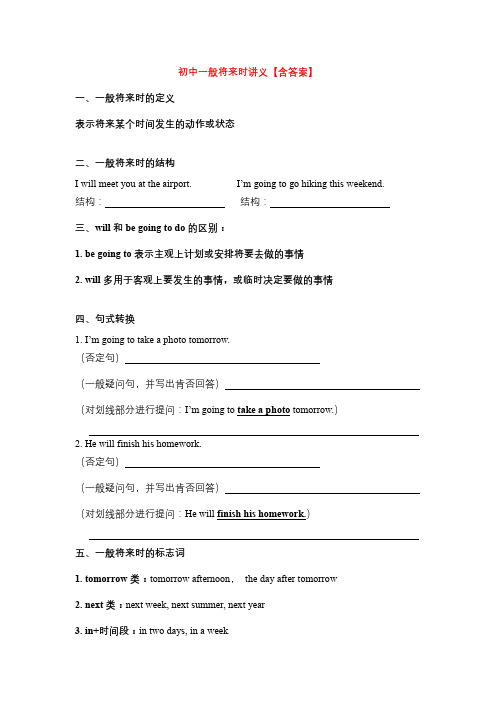
初中一般将来时讲义【含答案】一、一般将来时的定义表示将来某个时间发生的动作或状态二、一般将来时的结构I will meet you at the airport. I’m going to go hiking this weekend.结构:结构:三、will和be going to do的区别:1. be going to表示主观上计划或安排将要去做的事情2. will多用于客观上要发生的事情,或临时决定要做的事情四、句式转换1. I’m going to take a photo tomorrow.(否定句)(一般疑问句,并写出肯否回答)(对划线部分进行提问:I’m going to take a photo tomorrow.)2. He will finish his homework.(否定句)(一般疑问句,并写出肯否回答)(对划线部分进行提问:He will finish his homework.)五、一般将来时的标志词1. tomorrow类:tomorrow afternoon,the day after tomorrow2. next类:next week, next summer, next year3. in+时间段:in two days, in a week4.其他:in the future, one day, someday【课堂练习】1. We don’t know when __________ next week. Please call me when he arrives.A. will he arriveB. does he arriveC. he will arriveD. he arrives2. —How soon will he come back to Guangzhou?—I have no idea. Maybe he __________ in one or two days.A. will comeB. comesC. comeD. came3. ---will the train arrive?---It the station in 50 minutes.A. How soon; will get toB. How soon; arriveC. How long; will reachD. How far; gets to4. Will you at the bus stop at 10:30?A. meetingB. meetsC. meetD. met5. Lily and I to the concert it we free next week.A. go; areB. go; will beC. will go; will beD. will go; are初中一般将来时讲义(答案)一、一般将来时的定义表示将来某个时间发生的动作或状态二、一般将来时的结构I will meet you at the airport. I’m going to go hiking this weekend.结构:will+动词原形结构:am/is/are going to+动词原形三、will和be going to do的区别:1. be going to表示主观上计划或安排将要去做的事情2. will多用于客观上要发生的事情,或临时决定要做的事情四、句式转换1. I’m going to take a photo tomorrow.(否定句)I’m not going to take a photo tomorrow.(一般疑问句,并写出肯否回答)---Are you going to take a photo tomorrow?---Yes, I am. / No, I’m not.(对划线部分进行提问:I’m going to take a photo tomorrow.)What are you going to do tomorrow?2. He will finish his homework.(否定句)He will not finish his homework.(一般疑问句,并写出肯否回答)---Will he finish his homework?---Yes, he will. /No, he won’t.(对划线部分进行提问:He will finish his homework.)What will he do?五、一般将来时的标志词1. tomorrow类:tomorrow afternoon,the day after tomorrow2. next类:next week, next summer, next year3. in+时间段:in two days, in a week4.其他:in the future, one day, someday【课堂练习】1. We don’t know when __________ next week. Please call me when he arrives.A. will he arriveB. does he arriveC. he will arriveD. he arrives2. —How soon will he come back to Guangzhou?—I have no idea. Maybe he __________ in one or two days.A. will comeB. comesC. comeD. came3. ---will the train arrive?---It the station in 50 minutes.A. How soon; will get toB. How soon; arriveC. How long; will reachD. How far; gets to4. Will you at the bus stop at 10:30?A. meetingB. meetsC. meetD. met5. Lily and I to the concert it we free next week.A. go; areB. go; will beC. will go; will beD. will go; are。
中考一般将来时态讲解及习题和答案

中考一般将来时态讲解及习题和答案中考一般将来时态专题一.概念以及构成表示将来某个时间将要发生的动作或存在的状态,也表示将来经常或反复发生的动作,经常与表示将来的时间状语连用。
基本构成will+V/shall+V二.它的标志性时间状语1.含tomorrow; next短语;2.in+段时间;3.how soon;4.by+将来时间;5.by the time sb.do…6.祈使句句型中:or/and sb. will do7.在时间/条件状语从句中, 如果从句用一般现在时, 主句用将来时8.another day三.如何比较be going to 与will的使用:①be going to 表示近期、眼下就要发生的事情,will 表示的将来时间则较远一些。
e.g: He is going to write a letter tonight.He will write a book one day.②be going to 表示根据主观判断将来肯定发生的事情,will表示客观上将来势必发生的事情。
e.g:He is seriously ill. He is going to die.He will be twenty years old.③be going to 含有“计划,准备”的意思,而will 则没有这个意思,e.g:She is going to lend us her book. He will be here in half an hour.④在有条件从句的主句中,不用be going to, 而用will,e.g: If any beasts come at you, I'll stay with you and help you.四.主将从现详讲定义:if 引导的条件状语从句中,主句用将来时态,从句用现在时态。
If是连词,所连接的句子叫条件状语从句,表示假设或条件,意思是“ 如果…的话” 。
专项练习初中英语一般将来时讲解与练习(含答案)

初中英语:一般将来时专项练习题1.Some new airports _____________ in the west of our country. It will be very convenient to go there.A.built B.will build C.were built D.will be built 【答案】D【解析】【详解】句意:一些新的机场在我们国家西部将被建起来,去那儿将会非常方便。
A. built 建造,用于一般现在时态,主语复数时,主动语态; B. will build建造,用于一般将来时态,主动语态; C. were built 被建造,用于一般过去时态,主语复数时,被动语态; D. will be built被建造,用于一般将来时态,被动语态;根据Some new airports和build之间是被动关系,所以用被动语态;根据It will be very convenient to go there.可知用将来时态;故选D 点睛:被动语态的各个时态。
1)一般现在时态的 am /isare+done,例如:I am asked to study hard by my mother. 2)一般过去时态的 were/was+done,例如:A new shop was built last year. 3) 现在完成时态的 have/has been+done 例如:This book has been translated into Chiese. 4) 一般将来时态的 will be+ done, 例如:Many trees will be planted next year. 5)现在进行时态的 am/is/are+being+done,例如:My bike is being repaired by Tom now.2.—The 2016 Summer Olympic Games in Rio de Janeiro from August 5 to August 21.—Wow, we can enjoy the match then.A.will hold B.will be heldC.was held D.is holding【答案】B【解析】【详解】试题分析:句意:—2016年夏季奥运会将于8月5日到8月21日在巴西里约热内卢举行。
【语法专练】初中英语一般将来时讲解与练习(含答案)

初中英语:一般将来时专项练习题1.A lot of new roads _______ in order to develop the villages in the next five years.A.built B.were built C.will build D.will be built 【答案】D【解析】【详解】句意:为了发展农村在接下来的五年里,将会修建很多新的道路。
built修建,是过去式或过去分词形式;were built是一般过去时的被动语态;will build一般将来时态;will be built一般将来时的被动语态。
根据句中的时间in the next five years可知,这里表示将来的事情,应用一般将来时态;句子的主语A lot of new roads与动词构成被动关系,应用被动语态。
故选D。
2.— Zongzi to students for free in our dining hall on Dragon Boat Festival.—Really? That sounds cool!.A.offer B.have offeredC.are offered D.will be offered.【答案】D【解析】【详解】句意:-我们的餐厅将在端午节免费给学生粽子。
-真的吗?这听起来很酷!。
Zongzi是offer这一动作的承受者,该用被动语态。
结合语境可知该用一般将来时被动语态,所以选D。
3.--You know what? The graduation party ______ in our school hall on June 14th.-- Great! I’m looking forward to it!A.holds B.is held C.was held D.will be held 【答案】D【解析】【详解】句意:——你知道吗?毕业联欢会将于6月14日在我们学校的礼堂举行。
英语一般将来时专题(含答案)含答案解析百度文库
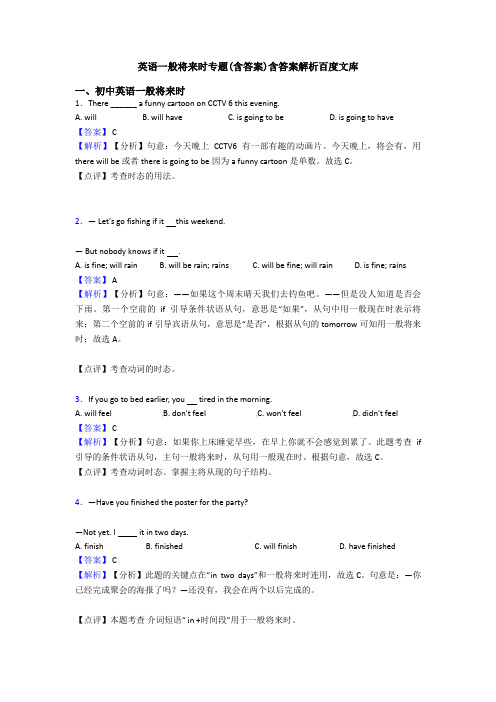
英语一般将来时专题(含答案)含答案解析百度文库一、初中英语一般将来时1.There ______ a funny cartoon on CCTV 6 this evening.A. willB. will haveC. is going to beD. is going to have【答案】 C【解析】【分析】句意:今天晚上CCTV6有一部有趣的动画片。
今天晚上,将会有,用there will be 或者there is going to be因为a funny cartoon是单数。
故选C。
【点评】考查时态的用法。
2.— Let's go fishing if it this weekend.— But nobody knows if it .A. is fine; will rainB. will be rain; rainsC. will be fine; will rainD. is fine; rains 【答案】 A【解析】【分析】句意:——如果这个周末晴天我们去钓鱼吧。
——但是没人知道是否会下雨。
第一个空前的if引导条件状语从句,意思是“如果”,从句中用一般现在时表示将来;第二个空前的if引导宾语从句,意思是“是否”,根据从句的tomorrow可知用一般将来时;故选A。
【点评】考查动词的时态。
3.If you go to bed earlier, you tired in the morning.A. will feelB. don't feelC. won't feelD. didn't feel【答案】 C【解析】【分析】句意:如果你上床睡觉早些,在早上你就不会感觉到累了。
此题考查if 引导的条件状语从句,主句一般将来时,从句用一般现在时。
根据句意,故选C。
【点评】考查动词时态。
掌握主将从现的句子结构。
4.—Have you finished the poster for the party?—Not yet. I it in two days.A. finishB. finishedC. will finishD. have finished【答案】 C【解析】【分析】此题的关键点在“in two days”和一般将来时连用,故选C。
一般将来时练习题含答案及解析
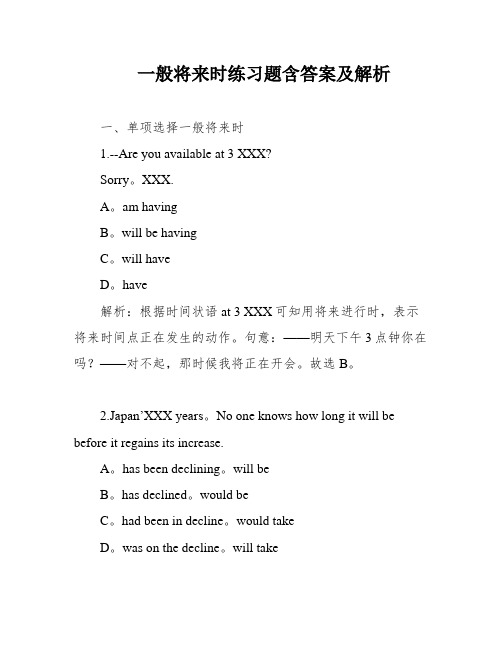
一般将来时练习题含答案及解析一、单项选择一般将来时1.--Are you available at 3 XXX?Sorry。
XXX.A。
am havingB。
will be havingC。
will haveD。
have解析:根据时间状语at 3 XXX可知用将来进行时,表示将来时间点正在发生的动作。
句意:——明天下午3点钟你在吗?——对不起,那时候我将正在开会。
故选B。
2.Japan’XXX years。
No one knows how long it will be before it regains its increase.A。
has been declining。
will beB。
has declined。
would beC。
had been in decline。
would takeD。
was on the decline。
will take解析:根据句意和时间指示词XXX和介词before可以判断前后应该分别采用现在完成进行时和一般将来时。
句意:日本经济在过去20年里一直在下滑。
谁也不知道在它恢复增长前还需要多长的时间。
根据句意可以判断,故选A。
3.If y ou add his wife’s e to his own。
the total of their e will add up to 3000 yuan.A。
add。
to。
will add up toB。
add up。
to。
adds up toC。
adds。
to。
will add up toD。
adds up。
to。
adds up to解析:主句用一般将来时,从句用一般现在时表将来。
Add。
to把。
加在。
add up to总计达。
add to增添。
句意:如果把他妻子的收入和他的收入加起来,总计达3000元。
故选A。
4.我下个星期六将要前往北京。
你知道星期六最早的航班什么时候起飞吗?(改写句子,删除明显有问题的选项)5.“你的窗户还是开着的吗?太冷了!” “哦,对不起,它们关不上。
一般将来时讲解与练习(含答案)
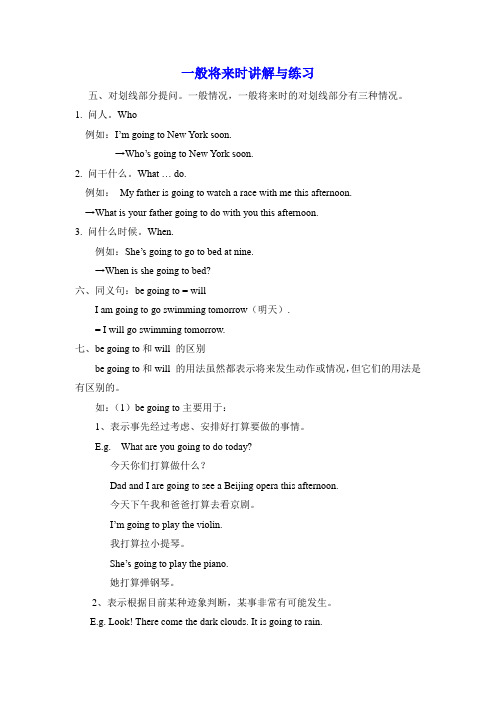
一般将来时讲解与练习五、对划线部分提问。
一般情况,一般将来时的对划线部分有三种情况。
1. 问人。
Who例如:I’m going to New York soon.→Who’s going to New York soon.2. 问干什么。
What … do.例如:My father is going to watch a race with me this afternoon.→What is your father going to do with you this aftern oon.3. 问什么时候。
When.例如:She’s going to go to bed at nine.→When is she going to bed?六、同义句:be going to = willI am going to go swimming tomorrow(明天).= I will go swimming tomorrow.七、be going to和will 的区别be going to和will 的用法虽然都表示将来发生动作或情况,但它们的用法是有区别的。
如:(1)be going to主要用于:1、表示事先经过考虑、安排好打算要做的事情。
E.g. What are you going to do today?今天你们打算做什么?Dad and I are going to see a Beijing opera this afternoon.今天下午我和爸爸打算去看京剧。
I’m going to play the violin.我打算拉小提琴。
Sh e’s going to play the piano.她打算弹钢琴。
2、表示根据目前某种迹象判断,某事非常有可能发生。
E.g. Look! There come the dark clouds. It is going to rain.瞧!乌云密集,天要下雨。
[语法]初中英语一般将来时讲解与练习(含答案)
![[语法]初中英语一般将来时讲解与练习(含答案)](https://img.taocdn.com/s3/m/c26c830e17fc700abb68a98271fe910ef12dae32.png)
初中英语:一般将来时专项练习题1.People in Urumqi are glad that Subway Line One by the end of the year 2017.A.will complete B.will be completedC.has completed D.is completed【答案】B【解析】【详解】句意:乌鲁木齐的人们很高兴地铁1号线将在2017年底完工。
will complete将要完成,一般将来时态;will be completed一般将来时的被动语态;has completed现在完成时;is completed一般现在时的被动语态。
根据句意可知,that从句中的主语Subway Line One与动词complete构成被动关系,应使用被动语态。
再根据句中的时间状语by the end of the year 2017可知,这里用一般将来时态,故选B。
2.The 31th Olympic Games _______ in Rio de Janeiro of Brazil in 2016. A.is held B.will holdC.will be held D.is going to hold【答案】C【解析】【详解】试题分析:句意:第31届奥运会将于2016年在巴西里约热内卢举行。
举办奥运会,The 31th Olympic Games在句中作主语,用被动语态。
2016年将要发生的动作,用一般将来时态。
故选C。
【考点定位】:考查动词时态及语态辨析。
3.Half of the work _________ in two days.A.will finish B.will be finished C.have beenfinished D.has been finished【答案】B【解析】【详解】句意:这项工作的一半将在两天后完成。
考查被动语态。
【英语】初中英语一般将来时讲解与练习(含答案)50题

初中英语:一般将来时专项练习题1.— When is the 32nd Olympic Games?— It ___________ in Tokyo, Japan in 2020.A.will be held B.is held C.was held【答案】A【解析】【详解】句意:——32届奥运会是什么时候?——它2020年在日本的东京。
奥运会应是被举行,被动语态的结构是be+过去分词;在2020年应用将来时态,结构是will+do。
故选A2.A new zoo in that area next year.A.built B.was builtC.builds D.will be built【答案】D【解析】【详解】试题分析:句意:一个新的动物园明年将要建成了。
根据时间状语next year.用一般将来时,有根据题意可知用被动语态be done的结构可知用将来时的被动语态。
结合句意,故选D考点:考查动词的时态和语态。
3.A large forest park near the lake next year.A.completes B.was completed C.will completeD.will be completed【答案】D【解析】【详解】句意:明年森林公园附近将建成一座大的森林公园。
考查动词时态。
A. completes一般现在时;B. was completed一般过去时的被动语态;C. will complete一般将来时;D. will be completed 一般将来时的被动语态。
根据next year可知此句时态是一般将来时,根据句意可知主语和动词是被动语态,故此句是一般将来时的被动语态;故选D。
4.We are very pleased to know that our school library ________ in only a few days.A.is decorating B.has decorating C.is decoratedD.will be decorated【答案】D【解析】【详解】句意:我们很高兴知道我们的学校图书馆将在几天后进行装潢。
- 1、下载文档前请自行甄别文档内容的完整性,平台不提供额外的编辑、内容补充、找答案等附加服务。
- 2、"仅部分预览"的文档,不可在线预览部分如存在完整性等问题,可反馈申请退款(可完整预览的文档不适用该条件!)。
- 3、如文档侵犯您的权益,请联系客服反馈,我们会尽快为您处理(人工客服工作时间:9:00-18:30)。
语法练习一般将来时一般将来时的概述:一般将来时表示将来某个时间要发生的动作或存在的状态,也可以表示将来经常或反复发生的动作。
常常和表示将来的时间状语连用,如:tomorrow,next week,in 2008等。
如:Li Lei will visit her grandmother tomorrow morning.一般将来时的用法:1.表示将要发生的动作。
如:Perhaps I shall (will) pay a visit to France this winter. 可能在今年冬天到法国观光。
We shan't (won’t) be free tomorrow. 我们明天没空。
Will you be at home at seven this evening? 今晚七点你会在家吗?The agreement will come into force next spring. 协议将在明年春天生效。
常用于此类情况的时间状语有:1).表示未来的时间状语tomorrow明天,next year明年,from now on从现在起,in a month一个月之后,in the future 将来,等。
2).包含现在的时间状语today今天,this evening今天晚上,this week这个星期,this month这个月,this year今年,等。
2. “be going to +do”多用于口语中,表示打算、表示将要发生的事情。
如:What are you going to do tomorrow? 明天你要干什么?We are going to visit the Summer Palace next week. 下个星期我们要去参观颐和园。
Look at the dark clouds, there is going to be a storm. 看那乌云,暴风雨快来了。
3. “be +to do”表示安排或计划好了的动作。
如:When are they to hand in their plan? 他们的计划什么时候交上来?The queen is to visit Japan next year. 女王将于明年访日。
4. “be about +to do”表示即将发生的动作。
如: He is about to retire. 他即将退休。
The English evening is about to begin. 英语晚会即将开始。
注意:be about to 一般不与时间状语连用。
5. come,go等动词用“一般现在时”表示按规定、计划或时间表将要发生的事。
如:He starts next week. 他下个星期出发。
We leave very soon. 我们很快就离开。
The train starts at 10 o'clock in the morning. 火车将在早上10点开出。
这类用法限于表示"移动"的动词:come来,go去,leave离开,start出发,begin开始,arrive 到达,depart离开,stay逗留,等。
6. come,go等动词在口语中用“现在进行时”表示主语计划将要做的动作。
如:They are leaving for New York tomorrow. 明天他们将要动身前往纽约。
Is your brother departing soon? 你的兄弟很快就要启程吗?这类情况常与come来,go去,leave离开,start开始,begin开始,arrive到达,depart离开,stay逗留,等动词连用。
所用的动词必须是动作而不是状态,主语必须是人。
come,go等动词的用法比较:come,go等动词用“一般现在时”表示按规定、计划或时间表将要发生的事。
(较为严格,正式;主语可以是人,也可以是交通工具、会议、戏剧或电影。
)come,go等动词在口语中用“现在进行时”表示主语计划将要作的动作。
(较为宽松,主语必须是人。
)如:The train leaves the station at 11:20. 火车将在11点20分离站。
We are leaving for Boston next week. 我们将在下周前往波士顿。
What time does the film begin? 电影几点开映?Is your sister staying here long? 你的姐妹在这儿会逗留很长时间吗?He starts next week. 他下周出发。
She is departing soon. 她很快就要动身。
will和be going to的选用原则:1. 关于“打算”原先做好的打算用“be going to”。
如:“Kate is in hospital.” “Yes, I know. I am going to see her this afternoon.”“凯特在住院。
”“是的,我知道。
我下午要去看她。
”说话时即时的打算用“will”。
如:“Kate is in hospital.” “Oh, really, I didn’t know. I will go and see her at once.” “凯特在住院。
”“哦,是吗?我都不知道呢。
我得马上去看她。
”2. 关于“预料” 在有迹象表明的情况下的预料用“be going to”如:Look at the clouds. It’s going to rain. 你看天上的云。
快下雨了。
My God! We are going to crash. 天哪!我们快撞车了。
在没有迹象表明的情况下进行的猜测用“will,be going to”皆可。
如:I think the weather will be nice.I think the weather is going to be nice. 我想天会晴朗。
Do you think the car will start?Do you think the car is going to start? 你想车能发动起来吗?3. 当动词表示内心活动时,表示猜测的句子必须用“will”如:I think she will like the cake I made for her. 我想她会喜欢我为她做的蛋糕。
4. 表示将要发生的动作如:Perhaps I shall (will) pay a visit to France this winter. 我可能在今年冬天到法国观光。
We shan't (won’t) be free tomorrow. 我们明天没空。
Will you be at home at seven this evening? 今晚七点你会在家吗?The agreement will come into force next spring. 协议将在明年春天生效。
一般将来时练习一、用所给动词的一般将来时填空1. I ______(leave)in a minute. I ______(finish)all my work before I ______ (leave).2. —How long _____ you _____(study)in our country?—I _____(plan)to be here for about one more year.—I _____(hope)to visit the other parts of your country.—What ______ you ______(do)after you ______(leave)here?—I ______(return)home and ______(get)a job.3. I ______(be)tired. I ______(go)to bed early tonight.4. Mary’s birthday is next Monday, her mother _____(give)her a present.5. It is very cold these days. It ______(snow)soon.6. —_____ you _____(be)here this Saturday?—No. I ______(visit)my teacher.7. —______ I ______(get)you a copy of today’s newspaper?—Thank you.8. I am afraid there ______(be)a meeting this afternoon. I can’t join you.9. Mike ______(believe, not)this until he ______(see)it with his own eyes.10. Most of us don’t think their team ______(win).二、单项选择1. There __________ a meeting tomorrow afternoon.A. will be going toB. will going to beC. is going to beD. will go to be2. Charlie ________ here next month.A. isn’t workingB. doesn’t workingC. isn’t going to workingD. won’t work3. He ________ very busy this week, he ________ free next week.A. will be; isB. is; isC. will be; will beD. is; will be4. There ________ a dolphin show in the zoo tomorrow evening.A. wasB. is going to haveC. will haveD. is going to be5. –________ you ________ free tomorrow?– No. I ________ free the day after tomorrow.A. Are; going to; willB. Are; going to be; willC. Are; going to; will beD. Are; going to be; will be6. Mother ________ me a nice present on my next birthday.A. will givesB. will giveC. givesD. give7. – Shall I buy a cup of tea for you?–________. (不,不要。
